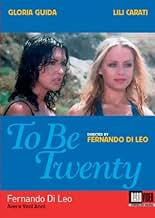NOTE IMDb
5,8/10
1,3 k
MA NOTE
Lia et Tina sont deux jolies jeunes filles avec beaucoup de choses en commun. Elles décident de faire de l'auto-stop jusqu'à Rome pour trouver la communauté hippie de Nazariota, mais les cho... Tout lireLia et Tina sont deux jolies jeunes filles avec beaucoup de choses en commun. Elles décident de faire de l'auto-stop jusqu'à Rome pour trouver la communauté hippie de Nazariota, mais les choses ne se passent pas comme prévu.Lia et Tina sont deux jolies jeunes filles avec beaucoup de choses en commun. Elles décident de faire de l'auto-stop jusqu'à Rome pour trouver la communauté hippie de Nazariota, mais les choses ne se passent pas comme prévu.
- Réalisation
- Scénario
- Casting principal
Carmelo Reale
- Head of rapists
- (as Roberto Reale)
Raul Lovecchio
- Vice-commissioner
- (as Raoul Lo Vecchio)
Salvatore Billa
- Delinquente in Bar
- (non crédité)
Angelo Boscariol
- Cliente in trattoria
- (non crédité)
Avis à la une
I have seen a shortened cut of "Avere Vent'Anni" but now I've watched the full-length version twice and there's a lot more to this film than some people seem to think. Fun is poked at bourgeois society, at self-important males doing jobs they think are important (store detectives, police inspectors), at a rich lesbian, at transcendental meditation, in short at many facets of seventies' life in Italy. Even the two female leads come in for their share. The ending can be seen as having nothing to do with the story, but I think there's more to it: while the girls just flit through life taking nothing seriously except having a good time, lurking at almost every corner is the reality of corrupt policemen and unscrupulous gangsters - the nasty side of the real world ... and in the end that will be their downfall.
Some time in the mid-70s, out-of-luck director Fernando di Leo had a million dollar idea: Why not do a remake of one of the top grossing blockbusters of 1969, with a slightly altered tagline: "Two chicks went looking for Italia and couldn't find it anywhere." And since those chicks would hitchhike across the country to join a hippie community, they didn't even need those pricey motorbikes! The Captain America role went to Euro teen star blonde Gloria Guida, the Billy part to the lesser-known Lilli Carati, a downright stunning brunette literally acting out every single word of her dialogue: I'm young, hot, and p*ssed off. Does anybody here f*ck?" A radically pessimistic statement from the bleak opening beach scene to the unforeseeable (and utterly disgusting) climax, Avere vent'anni bites off more than di Leo could chew: His counterculture swan song about two female libertines who inescapably will go to the dogs never finds a rhythm, a loose, sloppy concoction of scenes that don't blend, a programmatic reading from Valerie Solanas's SCUM manifesto (A pip-squeak with dysfunctional femininity that despises women: That is man.") remaining fairly more than a nod to the feminist zeitgeist in Fernando's T&A exploitation circus. Two stars for the boisterous performance of the lead actresses, reciprocating between vulnerability, sexual aggression, and pure, breathless joie de vivre, especially in the dance scene on the piazza; another one for Ray Lovelock's fine interpretation of a disenchanted druggie, and one and a half for the super catchy theme song. Ah, and as for Signorina Carati: Eat your heart out, Dennis Hopper.
In his 1978 film "Avere vent'anni" (To Be Twenty), director Fernando Di Leo attempts to capture the essence of youth, rebellion, and the complexities of growing up during a tumultuous era in Italy. Starring Gloria Guida and Lili Carati as two young women embarking on a journey of self-discovery, the film offers an intriguing blend of drama, comedy, and social commentary. However, despite its promising premise and some noteworthy performances, the movie ultimately falls short of delivering a truly memorable experience.
The film follows Lia (Gloria Guida) and Tina (Lili Carati) as they escape their restrictive lives in search of freedom and adventure. Their journey takes them from the countryside to the bustling city, where they encounter a variety of characters and situations that challenge their beliefs and force them to confront their own naivety. As they navigate their way through this new world, they must also grapple with issues such as sexuality, politics, and the ever-present threat of violence.
One of the film's strongest aspects is its depiction of the social and political climate of 1970s Italy. Di Leo does an excellent job of capturing the tension and unrest that permeated the country during this time, as well as the sense of disillusionment felt by many young people. The film's exploration of these themes adds a layer of depth and relevance that elevates it above a simple coming-of-age tale.
Another highlight of "Avere vent'anni" is the chemistry between Gloria Guida and Lili Carati. Their performances as Lia and Tina are both engaging and believable, effectively conveying the sense of excitement, confusion, and trepidation that comes with being on the cusp of adulthood. The bond between their characters is palpable, and their friendship serves as the emotional core of the film.
However, despite these strengths, "Avere vent'anni" suffers from a number of flaws that prevent it from reaching its full potential. One of the most glaring issues is the film's uneven tone, which oscillates between serious drama and slapstick comedy without ever finding a satisfying balance. This inconsistency can be jarring at times, and it often undermines the emotional impact of certain scenes.
Additionally, the movie's pacing can be sluggish, with some sequences feeling overly drawn out and others rushing through important plot points. This unevenness makes it difficult to fully invest in the story or the characters, and it contributes to a sense of disjointedness that permeates the film.
In conclusion, "Avere vent'anni" is a film with both commendable qualities and significant flaws. While its exploration of 1970s Italian society and the performances of Gloria Guida and Lili Carati are certainly noteworthy, the movie's uneven tone and pacing issues ultimately detract from its overall impact. Despite these shortcomings, however, the film remains an intriguing, if flawed, examination of youth, rebellion, and the search for identity during a tumultuous period in history.
The film follows Lia (Gloria Guida) and Tina (Lili Carati) as they escape their restrictive lives in search of freedom and adventure. Their journey takes them from the countryside to the bustling city, where they encounter a variety of characters and situations that challenge their beliefs and force them to confront their own naivety. As they navigate their way through this new world, they must also grapple with issues such as sexuality, politics, and the ever-present threat of violence.
One of the film's strongest aspects is its depiction of the social and political climate of 1970s Italy. Di Leo does an excellent job of capturing the tension and unrest that permeated the country during this time, as well as the sense of disillusionment felt by many young people. The film's exploration of these themes adds a layer of depth and relevance that elevates it above a simple coming-of-age tale.
Another highlight of "Avere vent'anni" is the chemistry between Gloria Guida and Lili Carati. Their performances as Lia and Tina are both engaging and believable, effectively conveying the sense of excitement, confusion, and trepidation that comes with being on the cusp of adulthood. The bond between their characters is palpable, and their friendship serves as the emotional core of the film.
However, despite these strengths, "Avere vent'anni" suffers from a number of flaws that prevent it from reaching its full potential. One of the most glaring issues is the film's uneven tone, which oscillates between serious drama and slapstick comedy without ever finding a satisfying balance. This inconsistency can be jarring at times, and it often undermines the emotional impact of certain scenes.
Additionally, the movie's pacing can be sluggish, with some sequences feeling overly drawn out and others rushing through important plot points. This unevenness makes it difficult to fully invest in the story or the characters, and it contributes to a sense of disjointedness that permeates the film.
In conclusion, "Avere vent'anni" is a film with both commendable qualities and significant flaws. While its exploration of 1970s Italian society and the performances of Gloria Guida and Lili Carati are certainly noteworthy, the movie's uneven tone and pacing issues ultimately detract from its overall impact. Despite these shortcomings, however, the film remains an intriguing, if flawed, examination of youth, rebellion, and the search for identity during a tumultuous period in history.
I had seen this before but in the much altered English language version without the the awful denouement of this original cut. Some consider the difficult and explicitly violent end rather inappropriate and not in keeping with the rest of the film. But, Fernando Di Leo was a fine director who also wrote much of the films he made, including this one and most of his films had a strong political stance. His, Caliber 9 is a great crime thriller example and this is a very decent sexploitation one. The lovely Gloria Guida is a bit led astray by the character played by Lilli Carati, as the cheat, steal and generally behave obnoxiously in the name of freedom. I don't know how realistic the commune presented here was in Italy but it doesn't seem like any other I've seen depicted. Even Valerie Solanas' S.C.U.M manifesto gets quoted here in the name of feminism and it is about at this stage (when a film maker is introduced) that we begin to realise what a gigantic swipe the writer/director is taking at the counter culture and its opponents. Nobody comes out of this well and the brilliantly directed ending will haunt for some time.
Fernando Di Leo is a director that gets a lot of criticism; and most of it is unfair in my opinion as he's directed a lot of the best Italian crime movies of the seventies, as well as some other curious gems. To Be Twenty is something of a departure from his crime films and doesn't really fit into any of the main genre headings that were popular in seventies Italy; although at a stretch it could be described as a cross between a sex comedy and an exploitation flick. The film is slightly misguided and that is its main problem as on the one hand it's light and breezy, and on the other hand it actually tries to make some points...with mixed results. The plot focuses on two young girls who are both young, hot and angry that meet on a beach. They set off to hitch a lift together and so begins an odyssey as the pair try to create an existence for themselves in a world overridden with sex, perverts and drugs. They manage to find a place to stay but not everything goes to plan and before long, the girls find themselves living a nightmare.
The tone of the movie is one of the best things about it as the director excellently captures the hippy-style care free atmosphere through the two young girls. The film stars Gloria Guida and Lilli Carati; both of whom serve the movie well in the looks department, especially when their clothes come off, but don't exactly set the film on fire with great acting. However, luckily this is a film that doesn't need great acting to succeed. The plot flows well and the two girls provide likable characters that make the film fun to watch. It's not exactly plot heavy and the film basically follows the girls on their unplanned journey right up until we come to the tragic ending. The ending is actually rather strange as it doesn't fit the tone of the movie and actually looks more like something straight out of a roughie film. However, it is rather powerful and won't be forgotten in a hurry; and the reason for that is mostly down to the way we are made to like the characters throughout the film. Overall, this film probably won't be for everyone's taste; but if you like this sort of stuff, you could do worse.
The tone of the movie is one of the best things about it as the director excellently captures the hippy-style care free atmosphere through the two young girls. The film stars Gloria Guida and Lilli Carati; both of whom serve the movie well in the looks department, especially when their clothes come off, but don't exactly set the film on fire with great acting. However, luckily this is a film that doesn't need great acting to succeed. The plot flows well and the two girls provide likable characters that make the film fun to watch. It's not exactly plot heavy and the film basically follows the girls on their unplanned journey right up until we come to the tragic ending. The ending is actually rather strange as it doesn't fit the tone of the movie and actually looks more like something straight out of a roughie film. However, it is rather powerful and won't be forgotten in a hurry; and the reason for that is mostly down to the way we are made to like the characters throughout the film. Overall, this film probably won't be for everyone's taste; but if you like this sort of stuff, you could do worse.
Le saviez-vous
- AnecdotesNamed #8 on the list of 10 Best Sexploitation Movies of All Time by website TheCinemaholic in 2017.
- Versions alternativesThe movie was re-cut shortly after the Italian release. The 81-minute version omits the opening scene on the beach, the sequence featuring explicit lesbian sex between the two main characters, and the violent ending.
- Bandes originalesAvere vent'anni
Written by Silvano Spadaccino (as Spadacino), Fernando Di Leo (as Di Leo)
Sung by Gloria Guida
Meilleurs choix
Connectez-vous pour évaluer et suivre la liste de favoris afin de recevoir des recommandations personnalisées
- How long is To Be Twenty?Alimenté par Alexa
Détails
- Durée1 heure 34 minutes
- Mixage
- Rapport de forme
- 1.85 : 1
Contribuer à cette page
Suggérer une modification ou ajouter du contenu manquant

Lacune principale
By what name was Avoir vingt ans (1978) officially released in India in English?
Répondre



























